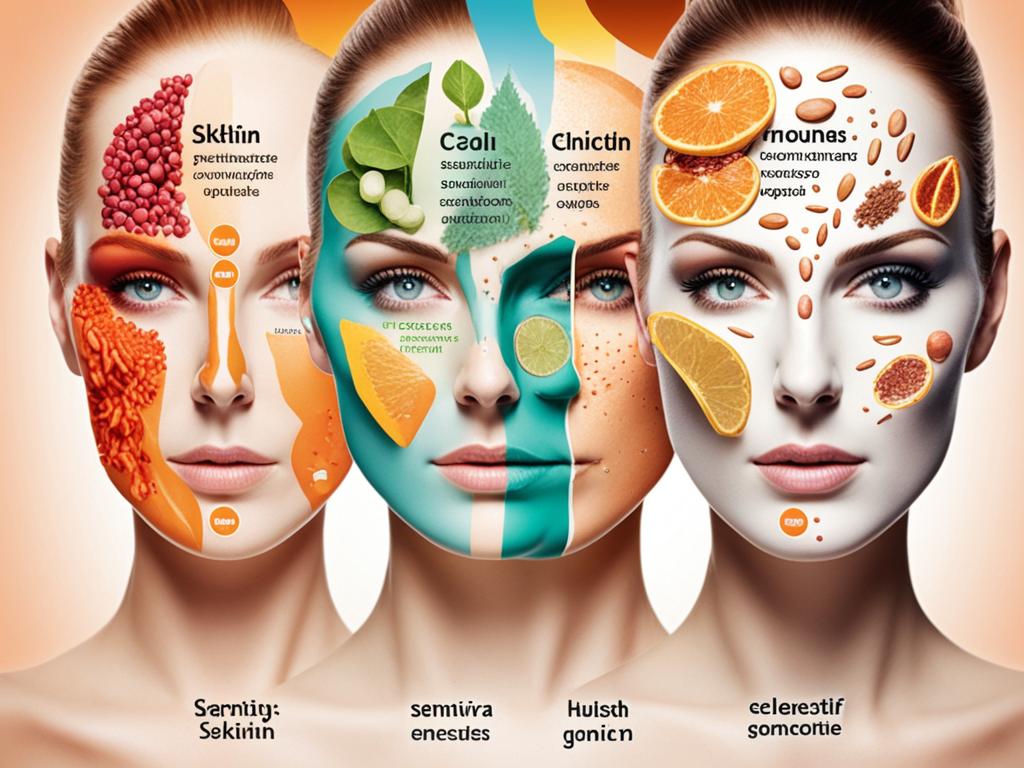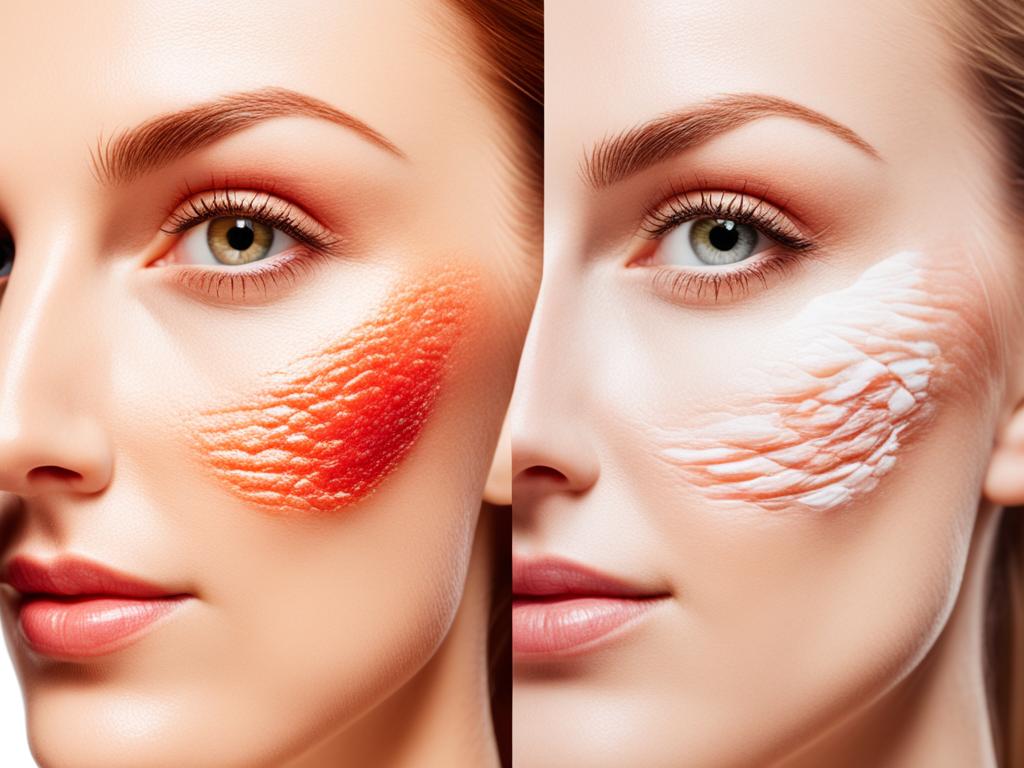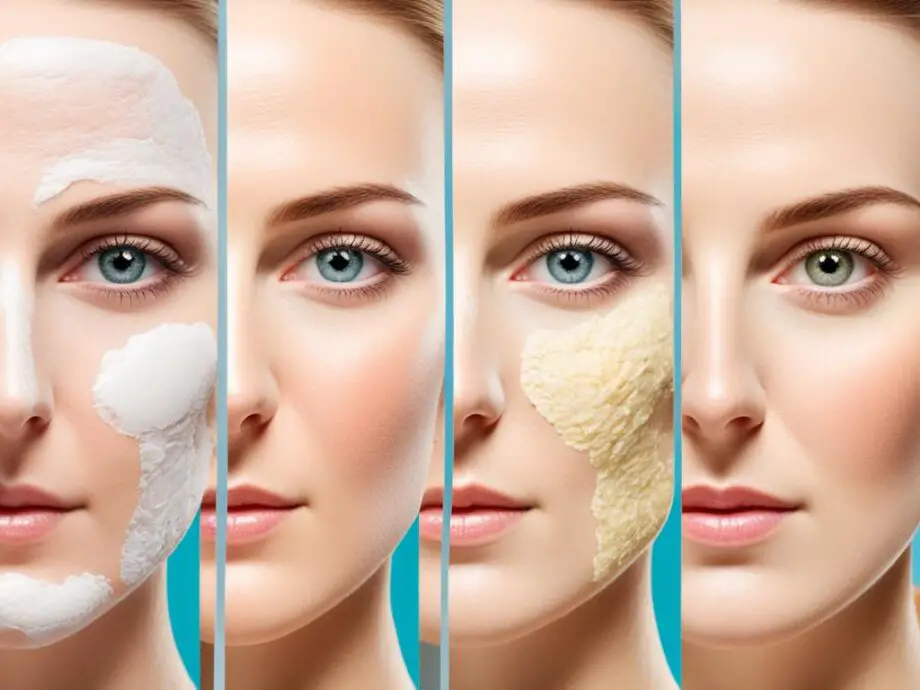When it comes to skincare, understanding the unique needs of your skin is crucial for achieving a healthy and radiant complexion. Two common terms you may have come across are sensitive skin and sensitized skin.
While both conditions can result in similar skin reactions, it is essential to recognize the differences between sensitive and sensitized skin to tailor your skincare routine effectively. Let’s dive into the key distinctions between the two:
Key Takeaways:
- Sensitive skin is characterized by an inherent skin condition that is naturally prone to react to certain triggers, whereas sensitized skin is a temporary state of sensitivity caused by external factors.
- Sensitive skin is primarily influenced by genetics and tends to be more consistent in its reactions, whereas sensitized skin can occur at any point in life due to various factors such as environmental aggressors, harsh skincare products, or lifestyle changes.
- Signs of sensitive skin include redness, itching, and dryness, while sensitized skin may exhibit these symptoms along with a heightened reaction to products that have been previously well-tolerated.
- Proper care for sensitive skin involves using gentle, fragrance-free products and avoiding common irritants, while sensitized skin requires identifying and eliminating the triggers that caused the sensitivity.
- Consulting with a dermatologist is recommended to accurately determine whether you have sensitive or sensitized skin and to establish an appropriate skincare routine tailored to your needs.
By understanding the differences between sensitive and sensitized skin, you can take proactive steps to care for your skin effectively and enjoy a healthy, balanced complexion.
Causes of Sensitive and Sensitized Skin
In this section, we will explore the causes of both sensitive and sensitized skin. Understanding these causes is essential for identifying the root of skin sensitivity and finding the most suitable skincare solutions.
Genetics
Genetics plays a significant role in determining skin sensitivity. If you have a family history of sensitive skin, you are more likely to inherit a predisposition to skin conditions like eczema or rosacea. These genetic factors can make your skin more susceptible to irritants and allergens.
Environmental Triggers
Your environment can have a direct impact on the sensitivity of your skin. Exposure to harsh weather conditions, pollution, and UV radiation can weaken your skin’s protective barrier. This weakened barrier makes it easier for irritants and allergens to penetrate the skin, leading to sensitivity and irritation.
Allergies
Allergies can trigger skin sensitivity and contribute to the development of sensitized skin. Allergic reactions to certain ingredients or substances, such as pollen, pet dander, or certain fabrics, can cause redness, itching, and inflammation. Identifying and avoiding these allergens is crucial for managing sensitive skin.
Skincare Product Reactions
Using skincare products that contain harsh ingredients or irritants can cause skin sensitivity or sensitization. Ingredients like fragrances, preservatives, and certain acids can disrupt the skin’s natural balance and trigger adverse reactions. It is essential to choose gentle, hypoallergenic products formulated for sensitive skin to minimize the risk of further sensitization.
By understanding the various causes of sensitive and sensitized skin, we can make informed decisions about our skincare routines and minimize potential triggers.
To visually illustrate the causes of sensitive and sensitized skin, refer to the table below:
| Causes | Effects on Skin |
|---|---|
| Genetics | Inherited predisposition to skin conditions |
| Environmental Triggers | Weakened protective barrier, increased susceptibility to irritants |
| Allergies | Allergic reactions, redness, itching, inflammation |
| Skincare Product Reactions | Disruption of the skin’s natural balance, adverse reactions |

Understanding the causes of sensitive and sensitized skin empowers us to make more informed choices in our skincare routines. In the next section, we will delve into the characteristics of sensitive and sensitized skin to further enhance our understanding.
Characteristics of Sensitive and Sensitized Skin
In this section, we will explore the key characteristics of sensitive and sensitized skin. By understanding these characteristics, you can better identify whether your skin falls into the category of sensitive or sensitized. Let’s dive in!
Sensitive Skin Characteristics
Sensitive skin is generally more reactive to external factors and certain ingredients. Here are some common characteristics to look out for:
- Redness: Sensitive skin tends to have visible redness or flushed appearance, especially after exposure to triggers like heat, wind, or certain skin products.
- Itching: Sensitivity often comes with an itchy sensation, which can be triggered by various environmental factors or even stress.
- Dryness: Sensitive skin types often experience dryness, leading to tightness and discomfort. It requires gentle hydration and moisturization.
- Easily Irritated Reactions: Sensitive skin reacts quickly and strongly to external factors, leading to stinging, burning, or tingling sensations.
Sensitized Skin Characteristics
Sensitized skin, on the other hand, refers to skin that has become temporarily reactive due to certain triggers or lifestyle habits. Here are some key characteristics:
- Redness: Similar to sensitive skin, sensitized skin can exhibit redness or a flushed appearance, but it is often temporary and may subside with proper care.
- Itching: Sensitized skin may also feel itchy, especially when exposed to triggers like harsh skincare products or environmental pollutants.
- Dryness or Oiliness: Sensitized skin can experience changes in moisture balance, leading to either dry or oily patches.
- Easily Irritated Reactions: Like sensitive skin, sensitized skin reacts quickly to triggers, resulting in discomfort, tingling, or even breakouts.
It’s important to note that both sensitive and sensitized skin require gentle care and suitable skincare products to maintain their health and minimize reactivity.

| Characteristic | Sensitive Skin | Sensitized Skin |
|---|---|---|
| Redness | Visible, persistent | Temporary |
| Itching | Frequent | Occasional |
| Dryness/Oiliness | Dry | Varies (often changing) |
| Easily Irritated Reactions | Strong and quick | Quick but usually subsides |
Effective Treatment and Skincare Routine for Sensitive and Sensitized Skin
When it comes to caring for sensitive and sensitized skin, a tailored treatment and skincare routine can make all the difference. By following the right practices and using suitable products, you can effectively manage your skin condition and maintain its health. Here are some essential tips to help you on your journey:
1. Choose Gentle Skincare Products
Sensitive and sensitized skin requires gentle and non-irritating products. Look for skincare items labeled as “fragrance-free,” “hypoallergenic,” or “for sensitive skin.” Avoid harsh ingredients like alcohol, fragrances, and sulfates, as these can trigger reactions and worsen skin sensitivity.
2. Moisturize Daily
Hydration is key for sensitive and sensitized skin. Find a moisturizer that is specifically formulated for your skin type and apply it daily, both in the morning and at night. Look for moisturizers with soothing ingredients like aloe vera, chamomile, or hyaluronic acid to calm and hydrate your skin.
3. Protect Your Skin from the Sun
UV rays can aggravate sensitive and sensitized skin, so it’s crucial to protect yourself from the sun’s harmful rays. Use a broad-spectrum sunscreen with an SPF of 30 or higher every day, even on cloudy days, and reapply every two hours if you’re exposed to direct sunlight.
4. Avoid Over-Exfoliation
While exfoliating can be beneficial for many skin types, it’s important to be gentle when dealing with sensitive or sensitized skin. Avoid physical exfoliants like harsh scrubs or brushes, as they can cause irritation. Instead, opt for chemical exfoliants with gentle ingredients like lactic acid or salicylic acid, and limit exfoliation to once or twice a week.
5. Practice Patch Testing
Before introducing new skincare products into your routine, it’s essential to perform a patch test. Apply a small amount of the product to a discreet area of your skin, such as the inside of your wrist, and wait 24 hours to see if any adverse reactions occur. This step can help you identify potential irritants before applying them to your entire face.
Remember, everyone’s skin is unique, so what works for others may not necessarily work for you. It’s important to listen to your skin, observe how it reacts to different products, and make adjustments accordingly.

Recommended Skincare Products:
| Product | Description | Key Ingredients |
|---|---|---|
| Gentle Cleanser | A mild cleanser that effectively removes impurities without stripping the skin. | Aloe Vera, Cucumber Extract |
| Soothing Toner | A calming toner that helps balance pH levels and soothes irritation. | Chamomile, Witch Hazel |
| Hydrating Serum | An intense hydrating serum that replenishes moisture and improves skin elasticity. | Hyaluronic Acid, Vitamin E |
| Fragrance-Free Moisturizer | A lightweight, fragrance-free moisturizer that nourishes and soothes sensitive skin. | Oat Extract, Ceramides |
| Sunscreen SPF 30+ | A broad-spectrum sunscreen that protects against UVA and UVB rays. | Zinc Oxide, Titanium Dioxide |
By following these tips and incorporating suitable products into your skincare routine, you can effectively treat and care for your sensitive or sensitized skin. Remember to be patient, as it may take time to find the perfect routine that works best for you. Consult with a dermatologist if you have any concerns or persistent skin issues.
Conclusion
Understanding the differences between sensitive and sensitized skin is crucial for personalized skincare. While they may share similar symptoms, such as redness and irritation, the causes and treatment approaches differ.
For individuals with sensitive skin, which is more genetic in nature, it is important to avoid triggers such as harsh chemicals and fragrances. Opting for gentle, hypoallergenic skincare products and maintaining a consistent routine can help manage and alleviate symptoms.
On the other hand, sensitized skin is often a result of external factors like environmental stressors or improper product use. By identifying and addressing these triggers, individuals can restore their skin’s barrier function and improve its resilience over time.
Overall, whether you have sensitive or sensitized skin, prioritizing skincare that caters to your specific needs is essential. Consultation with a dermatologist or skincare professional can provide further guidance in developing a tailored routine that promotes healthier, more radiant skin.
